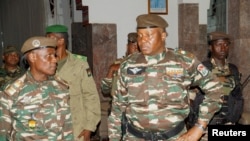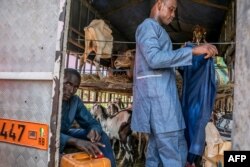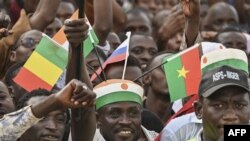- What impact have sanctions had? -
The borders of Benin and Nigeria have remained closed since the Economic Community of West African States banned trade with Niger, one of the world's poorest nations.
The cost of rice has since the week before the coup risen 21 percent, sorghum 24 percent, and maize 18 percent, according to the United Nations.
"The shortage rate for medicines has been around 30-55 percent since September 19," said Amadou Seyni Maiga, general secretary of Niger's College of Pharmacists.
United Nations' advocacy "has changed ECOWAS' position so as to take into account humanitarian needs," said UN humanitarian coordinator for Niger Louise Aubin, even if "humanitarian exemptions are slow to arrive."
Despite these concerns over the medium term, trade continues between landlocked Niger and other neighbours such as Algeria and the economic sanctions have not dented the determination of the military authorities and their followers.
Niamey can also count on Mali and Burkina Faso, where juntas also rule, after signing a mutual defence pact in case of a threat to sovereignty or territorial integrity.
- What's latest on negotiations? -
The West African regional bloc has threatened the coup leaders with military intervention if diplomatic pressure to reinstate the democratically elected President Mohamed Bazoum fails.
It has however kept relatively quiet about any intervention, which is considered high risk for both Niger and the region. In private, ECOWAS members states are divided and negotiations have not produced any agreement.
Niger's military regime led by General Abdourahamane Tiani, who has appointed a government, says it would like to have a maximum of three years before restoring democracy.
On the streets of Niamey, associations supporting the new regime say they are mobilised for a longer transition period.
"ECOWAS appears to be heading towards the middle ground but they will not accept the three-year transition proposed by Niger's military authorities," a regional diplomatic source said.
- Has France's position changed? -
The former colonial power has not recognised the authority of the military leaders, who have targeted the French presence, and for the time being Paris is still demanding the restoration of Bazoum.
But President Emmanuel Macron on Sunday said France was imminently to withdraw its ambassador from Niger, followed by its military contingent in the next months.
"France has decided to withdraw its ambassador. In the next hours our ambassador and several diplomats will return to France," Macron announced, adding that military cooperation was "over" and French troops would withdraw in "the months and weeks to come" with a full pullout "by the end of the year".
Niger's military leaders welcomed the move as a "step towards sovereignty".
- Has security improved? -
The Sahel nation has for years battled against armed jihadist groups.
Attacks have continued since the putsch, such as on August 15 when 17 Nigerien soldiers were killed.
The southwest, where Niger's borders meet Mali and Burkina Faso, remains the region worst hit by the violence.
- What's future for Bazoum? -
The elected president has remained confined in the presidential palace with his wife and son. On Wednesday his lawyer appealed to an ECOWAS court to free him in the name of "arbitrary arrest", "violation of freedom of movement" and to restore constitutional order.
The coup leaders who say they intend to try Bazoum for "high treason" on Thursday listed some 20 members of his government as wanted.
The regime, which justified its power grab by the deteriorating security situation and high level of corruption, on Wednesday announced the launch of an anti-corruption commission with a mission to recover "all public assets acquired illegally or misappropriated."
After weeks of rallies against ECOWAS and France, domestic politics is making a return in public debates and Bazoum's predecessor Mahamadou Issoufou, president from 2011 to 2021, is not being spared either.
"For 12 years the country has been pillaged, cheated. The first demand is above all is justice," said Clement Anatovi, an artist who has organised several public meetings in the capital.





















Forum